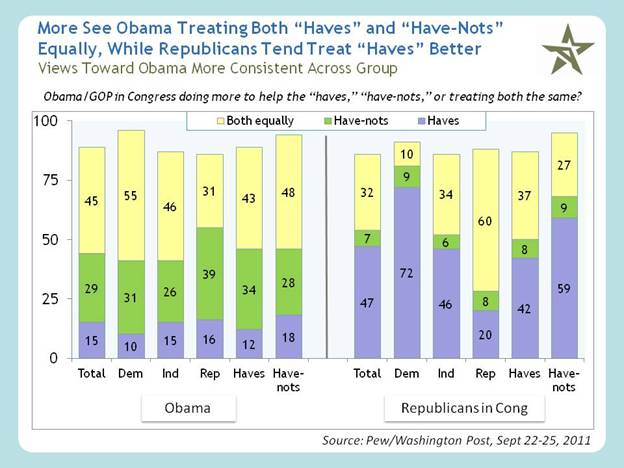
Republicans feel they've seized a winning talking point by labeling as "class warfare" Obama's plan to ask the wealthiest to pay a bit more in taxes. Is that label sticking? And does it hurt?
First, growing income inequality is a fact, not a talking point. And Americans are feeling the disparity. This recent poll from the Pew Research Center/Washington Post shows Americans increasingly describe society as divided between "haves" and "have-nots."
Americans are also decreasingly likely to count themselves among the "haves." Majorities of Republicans and those earning over $75,000 a year call themselves "haves" (66% and 75%, respectively), while other demographic groups are more divided, or consider themselves "have-nots."
Second, politically, more feel Obama is interested in helping the "haves" and "have-nots" equally, while Republicans in Congress prioritize the haves. The Pew/Washington Post poll shows half, or nearly half of Democrats and independents agree Obama "treats both the same." The nice folks at Pew ran a few additional crosstabs for me, and found "haves" and "have-nots" agree Obama treats both groups the same (43%, 48%).
Attitudes toward Republicans in Congress are more politically divisive, as you can see in the chart below. Both self-professed "haves" and "have-nots" feel Republicans prioritize the haves, but the "have-nots" feel so more keenly (42%, 59%, respectively).

Third, the phrase "class warfare" doesn't seem to resonate with non-Republicans. Poll Position recently asked whether "Obama's new tax plan amounts to class warfare" and found a plurality (42%) saying it's not (35% yes, 23% unsure). The poll found predictable breaks along GOP/Dem lines, although more Republicans say it's not class warfare (25%) than Democrats say it is (16%), with independents divided. With such a simple question, before an extended debate about Obama's jobs package, it's likely this mainly measures attitudes toward Obama himself, rather than toward any specific policy.
Fourth, the "Buffett Rule" and other policies to redistribute income are wildly popular, even with Republicans and investors. A recent PPP poll for DailyKos shows a full 73% support "ensuring people who make over a million dollars a year pay the same percentage of taxes or more...as those who make less...." No group opposes the so-called Buffett Rule; 66% of Republicans, 61% of conservatives and 52% of Tea Partiers are in favor. Even two-thirds of Bloomberg subscribers (including investors, analysts and traders worldwide) support the Buffett Rule.
This is consistent with what I've written before, showing policies asking the wealthy to pay more are far more popular than those that don't. In the wake of the debt-ceiling debate, this WSJ/NBC poll found the most "acceptable" policy for the Super-Committee is ending tax breaks for the wealthy (60% acceptable, 37% unacceptable). And a contemporaneous poll by Ipsos/Reuters found raising taxes on the wealthy one of the most popular ways to stimulate the economy.
Republicans are unlikely to get mileage attacking policies that ask the wealthy to pay their fair share, as even their own voters support more fairness. With its protracted use, the phrase "class warfare" might actually reinforce the perception that Republicans care more about the "haves." And how come it isn't called "class warfare" when Republicans want to end Medicare or Social Security as we know it, or curb unemployment or food stamp benefits?